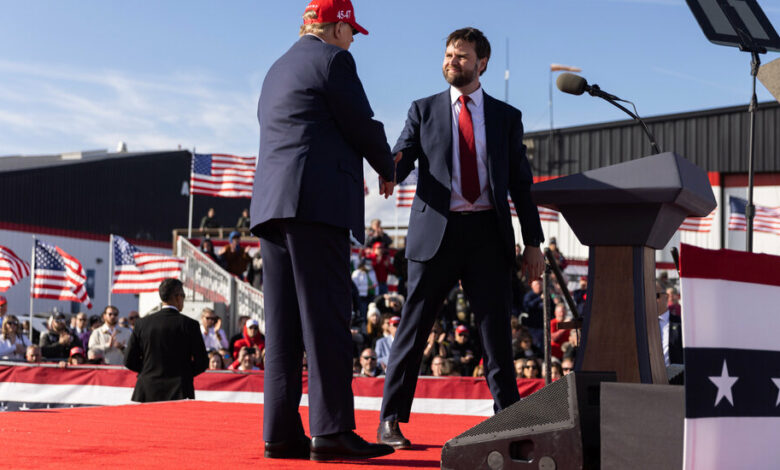By choosing a vice president, Trump is elevating the next generation of Republicans

Donald J. Trump has never shown much interest in grooming successors.
When he left as host of “The Apprentice,” he mocked his replacement’s ratings. There is no alumni network for former Trump White House staffers, as there is for the two presidents who preceded him. He gave his approval when supporters chanted “Hang Mike Pence” during the Jan. 6, 2021, Capitol riot, a former aide testified before Congress.
But a funny thing has happened on the way to naming a running mate: With an increasingly theatrical selection process aimed at a broad field of candidates — akin to reality TV — the former president has cultivated a new crop of rising stars within his party.
The group under consideration already includes some of the most coveted pro-Trump Republicans for cable news interviews. And their access to some of the party’s biggest donors has widened thanks to their newly polished Trump bona fides. Whoever isn’t chosen as the Republican vice presidential nominee will undoubtedly be among the first names discussed for the top of the ticket in 2028.
Reps. Byron Donalds of Florida, 45, and Elise Stefanik of New York, 40, along with Sen. J.D. Vance of Ohio, 39, are widely seen as some of the party’s most promising young stars. Sen. Marco Rubio’s conservative credentials have been burnished by Mr. Trump’s consideration of the Florida senator as a top candidate. Gov. Doug Burgum of North Dakota has emerged from political obscurity to become one of the former president’s most ardent defenders on television.
Sen. Tim Scott of South Carolina has gotten more attention being mentioned as a possible running mate than he did during his own presidential bid this year. Vivek Ramaswamy, an Ohio businessman, likely would have faded into the background after ending his own run for the White House, but he has been kept in the mix at Trump’s insistence at campaign events and fundraisers.
“Trump has been enormously helpful to these people,” said Newt Gingrich, a former House speaker who considered Trump as a running mate in 2016. “They are all bigger and better known than they would have been without Donald Trump.”
Mr. Trump has helped raise their profiles by repeatedly praising them at rallies and touting them as possible running mates. His campaign has also created an apparatus tailored specifically to that end. An internal booking team is specifically tasked with ensuring that candidates are booked for cable news interviews and quoted in conservative media. The campaign team has also helped candidates organize pro-Trump fundraisers and provided them with call lists of specific donors to solicit contributions to the Trump campaign, which could help them in the future as well.
But the candidates also bring benefits for Mr. Trump.
In recent years, some of the party’s most visible pro-Trump voices have also been some of its most controversial public figures, such as Rep. Marjorie Taylor Greene of Georgia, who was stripped of her committee position in 2021 after she sanctioned the executions of Democrats and spread dangerous and intolerant disinformation. There have also been some conservative figures, such as Mike Lindell, the CEO of MyPillow who has been a major financial supporter of Trump’s election denial movement.
Republicans like Mr. Vance, Mr. Rubio and Mr. Burgum all have a history of sharply criticizing Mr. Trump, but have now become among his most ardent defenders. By shedding their reservations about him and participating in the vice presidential selection process, they have made Mr. Trump more attractive to more traditional Republican voters and donors, while also demonstrating his total dominance of the party.
They have also become a credible army of pro-Trump, largely established voices for television interviews and fundraisers. After Mr. Trump makes his choice, the rest of this group will remain seasoned surrogates for the campaign as the election approaches.
Mark McKinnon, a longtime adviser to Republican presidential candidates, said Trump would have been wise not to target high-profile figures from his Make America Great Again movement, which he said might have enthused his base but would not have helped attract new voters.
“The interesting thing about what appears to be Trump’s short list is the dogs that don’t bark — no MAGA celebrities,” Mr. McKinnon said, adding that it was “good for Trump electorally in the short term, but also good for the party because it broadens its appeal.”
Trump has long insisted that whoever he chooses must be ready to succeed him in the White House, if necessary.
“We’ve got a lot of good people that we’re looking at,” Trump said in a June interview on Newsmax when asked about his running mate. “But the bottom line, and I’ve said this before, and I think a lot of people would say it, is if something were to happen, I think it would be bad, but if something were to happen, we need someone who can step in immediately and do a great job as president.”
The former president also appears to want to throw out as many names as possible to fuel speculation, but this has also increased the Republicans’ standing.
In one example, Mr. Trump gave an interview on Fox News in February in which he was asked about six politicians — Mr. Donalds, Mr. Ramaswamy, Mr. Scott, Gov. Ron DeSantis of Florida, former Rep. Tulsi Gabbard of Hawaii and Gov. Kristi Noem of South Dakota — and whether they were all on his “short list” of running mates.
Those six names weren’t all on his shortlist, according to people familiar with the running-mate search, but Mr. Trump confirmed that they were all contenders. That moment signaled to his aides that he was interested both in suggesting the search was broader than it was — and in helping to raise the profiles of his Republican allies.
In many ways, Mr. Trump owed this to his fellow Republicans. His out-of-nowhere presidential bid in 2016 has often been described as a hostile takeover of the party. But little attention has been paid to the impact of one of the key elements of that campaign: its effective undermining of what was widely seen as a deep and promising group of conservatives.
Bobby Jindal and Scott Walker, two young Republican governors who were seen as the future of the party at the time, ended their presidential bids before the first primaries in 2016, when Trump captured the attention of the news media and Republican voters. Both have since been sidelined.
Before launching their own 2016 bids, Texas Senator Ted Cruz was hailed as the “next great conservative hope” by National Review, and Senator Rand Paul of Kentucky was tagged as “the most interesting man in politics” on the cover of Time. Both eventually returned to the Senate, where they are now known more as key Trump allies than Republican wunderkinds.
After Trump gutted Jeb Bush’s campaign, ending the Bush family’s decades-long dominance of Republican politics, many observers wondered what would happen to the party.
“The Republican Party has a deep and talented team, as evidenced by the strength and diversity of leaders supporting President Donald J. Trump,” said Michael Whatley, chairman of the Republican National Committee.




